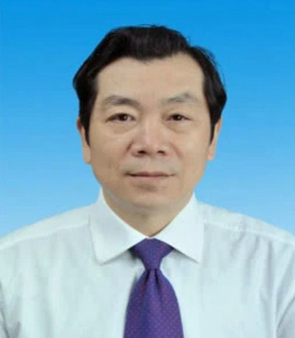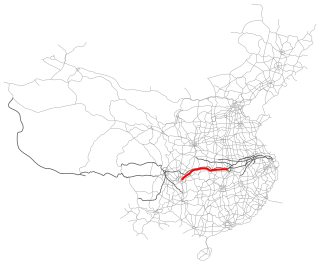Wuhan duck refers to several dishes from the city of Wuhan, in Hubei Province, China. The dishes are specific parts of a duck, including the tongue, head, feet, liver, kidney, and most popularly, the neck, often referred to as "spicy duck neck". [1] Common to all of these dishes is the colour, a deep reddish-brown, and the extremely spicy flavour. These items are sold in numerous provinces throughout China. [2] [3]

Wuhan is the capital of Hubei, China. With a population of over eleven million, it is the most populous city in Hubei and the seventh-most-populous city in China. It is also one of the nine national central cities.

Wuhan University is a public university in Wuhan, Hubei, China. It is affiliated with and funded by the Ministry of Education of China. The university is part of Project 985, Project 211, and the Double First-Class Construction.

Wuhan Optics Valley Football Club is a defunct football club that was located in the city of Wuhan, Hubei province, China. The club's home stadium was Xinhua Road Sports Center, while the important matches were played at the more modern stadium Wuhan Sports Center in China. Their fans were mainly from Hubei province and the club had supporters from the city of Wuhan, and the surrounding cities of Ezhou, Huangshi, and Xiaogan. It was founded in 1954 as the Hubei Football Team, while the professional football team was founded in February 1994. In 2008, the club quit the Chinese Super League because of what it believed to be unfair punishment after the club had a dispute with the Chinese Football Association over the club's on-field behaviour against Beijing Guoan in a league game. Some of its players formed a new team called Hubei Luyin and made a return to Chinese Super League in 2013.

The Hefei–Wuhan railway is a 250 kilometres per hour (160 mph) high-speed railway in Chinese provinces of Anhui and Hubei, with trains running from Anhui's capital Hefei to Hubei's capital Wuhan. The railway opened on 31 December 2008, high-speed services started on April 1, 2009. at 250 km/h (160 mph) and has been used by Shanghai–Nanjing–Hefei–Wuhan express trains since then.

Wuhan Yangtze River Football Club, formerly Wuhan Zall Football Club, was a Chinese professional football club that participated in the Chinese Super League under licence from the Chinese Football Association (CFA). The team was based in Wuhan, Hubei and their home stadium was the Dongxihu Sports Centre that has a seating capacity of 30,000. Their current majority shareholder is the investment company Wuhan Zall Development Holding Co. Ltd.

Qingshan District forms part of the urban core of and is one of 13 urban districts of the prefecture-level city of Wuhan, the capital of Hubei Province, China. On the right bank of the Yangtze, it borders the districts of Wuchang to the southwest and Hongshan to the east and south, except for Tianxing Island which lies due north of Qingshan; on the opposite bank it borders Jiang'an.

Huangpi District is one of 13 urban districts of the prefecture-level city of Wuhan, the capital of Hubei Province, China, situated on the northern (left) bank of the Yangtze River. The Sheshui enters the Yangtze at Huangpi. The district is primarily rural, but also includes important infrastructure facilities, such as Wuhan Tianhe International Airport and Wuhan North Railway Station, which is one of the main freight stations and classification yards on the Beijing–Guangzhou Railway. It is the northernmost of Wuhan's districts as well as the most spacious. On the left bank of the Yangtze, it borders the districts of Xinzhou to the east, and Jiang'an to the south, and Dongxihu to the southwest; on the opposite bank, it borders Hongshan. It also borders the prefecture-level cities of Huanggang to the northeast and Xiaogan to the northwest. The Sheshui enters the Yangtze River at Shekou in Huangpi.

Xinzhou is one of 13 urban districts of the prefecture-level city of Wuhan, the capital of Hubei Province, China, covering part of the city's northeastern suburbs and situated on the northern (left) bank of the Yangtze River. It is also the easternmost of Wuhan's districts. It borders the districts of Hongshan to the southwest and Huangpi to the west, as well as the prefecture-level cities of Huanggang to the north and east and Ezhou to the south.

The Shijiazhuang–Wuhan high-speed railway, or Shiwu passenger railway, is an 840 km (520 mi) high-speed rail line operated by China Railway High-speed between Shijiazhuang and Wuhan, the provincial capitals of Hebei and Hubei, respectively. Construction commenced in October 2008, with a total investment of 116.76 billion yuan. The design speed is 350 km/h (220 mph). It is part of the Jingguang passenger-dedicated line, a high-speed railway connecting Beijing and Guangzhou, which runs parallel to the older conventional Jingguang Railway.

The Wuhan–Jiujiang railway or Wujiu railway, is a double-track, electrified railroad in central China between Wuhan in Hubei Province and Jiujiang in Jiangxi Province. The line is 258 km (160 mi) long and follows the south bank of the Yangtze River from Wuchang District in Wuhan to Lushan Station in Jiujiang. Major cities and towns along the route include Wuhan, Huarong, Huanggang, Ezhou, Huangshi, Daye Yangxin, Ruichang and Jiujiang.

The Line 2 of Wuhan Metro is the first underground metro line crossing the Yangtze River. The line started its trial run on September 25, 2012, and officially opened on December 28, 2012. It is Wuhan's second metro line after Line 1, and the city's first underground line, since Line 1 is mostly elevated. Line 2 runs in a northwest–southeast direction, connecting Hankou and Wuchang, including Hankou Railway Station and major commercial districts.
Chicken and duck blood soup is a Shanghainese soup-based blood dish, using the blood of chicken and duck as a principal ingredient. Created by Xu Fuquan, a hawker from Shanghai, and described to be sour and spicy in taste, the dish is viewed as a healthy food with medicinal value in Shanghai.

Wuhan Metropolitan Area intercity railway or Wuhan Metropolitan Area intercity railway system is a network of higher-speed commuter railways in and around Wuhan, the capital of the Chinese province Hubei. The first line of the system opened at the end of 2013, two more in mid-2014, one in 2016.

Xunlimen Station is an interchange station between Line 1 and Line 2 of the Wuhan Metro. It entered revenue service along with the completion of Line 1 on July 28, 2004. The Line 2 platforms opened on December 28, 2012. It is located between Jianghan District and Jiangan District.

The Wuhan–Shenzhen Expressway, officially designated as G0422 and commonly abbreviated as Wushen Expressway, serves as a vital expressway in Central South China, seamlessly connecting the bustling cities of Wuhan, Hubei and Shenzhen, Guangdong.

Tangxun Lake, formerly Tangsun Lake, is a freshwater lake between Hongshan District and Jiangxia District in southeastern Wuhan, the capital of Hubei Province, China. It is south of Wuhan's Third Ring Road and north of its Fourth Ring Road. Tangxun Lake is the largest lake completely enclosed by a city in Asia.

Liang Wudong was a physician at Xinhua Hospital in Wuhan, Hubei, notable for being the first doctor to die from COVID-19 due to a nosocomial infection.
Wuhan Zhuankou Yangtze River Bridge, also known as Zhankou Yangtze River Highway Bridge, formerly known as Huangjiahu Yangtze River Bridge, Is a highway cable-stayed bridge located in Wuhan, Hubei, China, which crosses the Yangtze River and connects the Caidian District on the north shore of the Qingling Subdistrict of Xujiabao and the south bank are one of the important components and control engineering of Wuhan Fourth Ring Road, and Wuhan Junshan Yangtze River Bridge 9.2 kilometers, 7 kilometers from the Baishazhou Yangtze River Bridge downstream. The total length of the bridge is 5.296 kilometers. The main bridge structure is a five-span, one-twin, twin tower face steel box girder cable-stayed bridge with a main span of 760 meters and a bridge width of 46 meters.

The G0424 Beijing–Wuhan Expressway, also referred to as the Jingwu Expressway, is an under construction expressway in China that will connect Beijing to Wuhan, Hubei via Zhengzhou, Henan. The expressway is fully completed in Beijing and Hubei while a few sections in Hebei and Henan still remain under construction.

The G4223 Wuhan–Chongqing Expressway, also referred to as the Wuyu Expressway, is an expressway in China that connects Wuhan, Hubei to Chongqing.